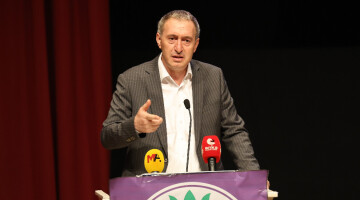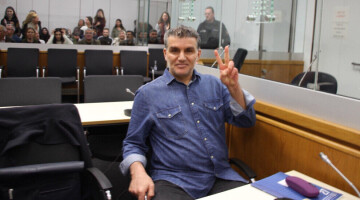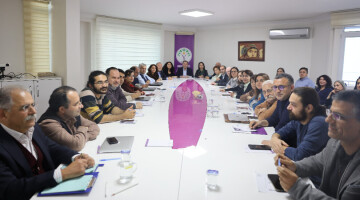Serêkaniyê (ar. Ras al-Ain) has been under Turkish occupation for two years. In the course of the invasion of northern Syria launched by the Turkish army and jihadist mercenaries on October 9, 2019, 300,000 civilians were forced to flee the region. Some of them have been accommodated by the Autonomous Administration of North and East Syria in the Washokani reception camp near Hesekê. The IDPs want to return to Serêkaniyê and the surrounding villages and have formed a committee for this purpose. The prerequisite for a secure return is the end of the Turkish occupation.
Regarding the current situation, the committee stated the following in Washokani on October 9: "The people who have remained in Serêkaniyê are living in very difficult conditions. In the city and surrounding villages, the extremist mercenary groups violate the rights of the people on daily basis. People are intimidated through brutal policies. They are abducted, murdered, tortured and ransom is extorted from them. These crimes of the Turkish state and its gangs are taking place in a planned and systematic way."
Yazidi Central Council campaigns for return
Against this background, a statement published by the Central Council of Yezidis in Germany (ZÊD) has met with massive criticism from Syrian Yazidis. The Union of Yezidis from Syria accuses the ZÊD of becoming an accomplice of the occupation regime and of speaking for the Yazidi community without legitimation. In a statement on November 8, the ZÊD announced that more Yazidis were returning to Serêkaniyê "with the support of the transitional government" and that it was optimistic that this trend would continue because the returnees were doing well.
In a statement, the Union of Yazidis from Syria pointed out the systematic persecution of minorities in the occupied territories, which are also confirmed by the U.S. Commission on International Religious Freedom (USCIRF). "Yazidi shrines are destroyed, women are kidnapped, raped. These are Islamists with the same ideology as that of ISIS, which committed genocide against our brothers and sisters in Sinjar (ku. Şengal) on August 3, 2014," the statement said. It said the association had pointed this out several times in talks with ZÊD and asked it to "refrain from its statements regarding the Yazidis in Syria, some of which are completely false or distorted, in the future. However, contrary to its promises, it has continued." Representatives of ZÊD had held talks in Turkey and visited the said area in Syria. Therefore, it said, it can be assumed "that dirty deals are being conducted behind closed doors."
"The ZÊD has no right to speak in the name of the Yazidis”
The Turkish occupied zones in the northern and northwestern parts of Syria are now considered safe havens for Islamists guilty of serious war crimes. The Autonomous Administration of North and East Syria warns against a revival of ISIS and a permanent annexation of Syrian parts by Turkey.
"The terror and machinations of these Islamist gangs, the so-called transitional government, are legitimized by the self-proclaimed Central Council. Because of this, several associations have understandably declared their withdrawal from the Central Council of Yazidis in Germany. The Central Council has been instrumentalized for personal interests from the beginning and thus, unfortunately, another valuable attempt to form an alliance between all Yazidis in Germany has failed. The ZÊD has dismantled itself single-handedly and maneuvered itself into insignificance. It has no right or legitimacy to speak in the name of the Yazidis, let alone the Yazidis from Syria," said the Union of Yazidis from Syria.












